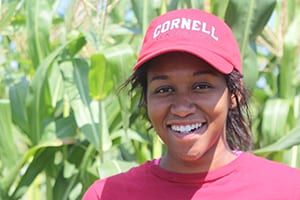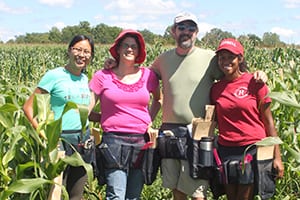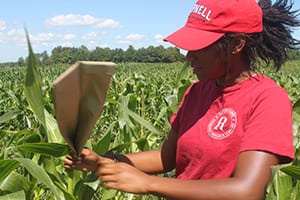News
Cairo Archer Wants to Level the Growing Field

Cairo Archer, Cornell undergraduate in plant science and nutritional sciences. (Photo by Patricia Waldron)
With aplomb, Cairo Archer dons the many-pocketed apron, complete with stapler, scissors, marker, paper bags and water bottle—all the tools and raw materials needed for a long day of corn pollination.
After a quick coat of sunscreen, the Cornell sophomore ventures with postdoctoral researcher and mentor Vered Tzin into the cornfield to hand-pollinate the ears in a time-consuming and labor-intensive process that ensures clean genetic lines for their experiments. They are attempting to identify genes in corn that produce defensive compounds, which deter feeding insects. This is Archer’s second year of hand-pollination. After starting as a high school intern in 2014 at the Boyce Thompson Institute, she has continued to work in the Jander laboratory.
“She’s great,” said Tzin. “She’s dedicated and I think she knows how to balance research, school and life. She’s comfortable discussing questions with other people and is independently motivated.”
Establishing scientific prowess, however, is just one step towards Archer’s life goals. She can see herself doing research to develop genetically enhanced crops that will increase food production and decrease environmental impact. But she also sees a great need for educating people about new crop varieties, and encouraging institutional change for acceptance of genetically modified crops.
“But I have no idea how I’m going to do that,” Archer laughs. “No idea.”

Visiting scholar Ana Laura Alonso Nieves, Vered Tzin, Kevin Ahern and Cairo Archer, in the field. (Photo by Patricia Waldron)
Despite the loftiness of her goals, she’s taking concrete steps in the right direction. Archer is a double major in plant science and nutritional sciences, a multidisciplinary division encompassing everything from how the body gets nutrition from food, to the psychology of food choices to issues surrounding food insecurity and the global food trade. Archer is certain that she’ll attend graduate school in the future, but is not sure which discipline she’ll choose. She is also contemplating an intervening stint in the Peace Corps.
Archer first became involved with BTI through its Plant Genome Research Program internship for high school students. A previous intern and friend since middle school, Felix Fernandez-Penny, encouraged her to apply. She liked the experience so much that she has stayed on through the following school year and into the next.
But Archer’s interest in plants predates the internship. Her father grew up in Guyana, where his father maintained rice paddies and cattle herds. Her mother grew up in Guyana and England. Archer’s family has made three, two-week trips to visit Guyana. The long visits gave her a feel for the pace of life in Guyana, the chance to eat herself sick on mangoes and an appreciation for how hard her grandfather works. Having roots in a country where a significant number of people still suffer from malnutrition—children especially—has inspired her interest in breeding more productive crops to address food insecurity.
In Ithaca, Archer tends a garden plot with her father, growing fruits and vegetables for the family. While he tries to breed spicier peppers, she enjoys crossing different flower varieties.
Back in the cornfield, the pollinators take a break from crossing and detasseling—removing the feathery, pollen-producing tops of the stalk. It’s a mild day, but there is no shade in the cornfield and few clouds in the deep blue sky, which makes for sweaty work. One of the lab members has misplaced his clipboard, containing the location of each genetic line, amidst the rows of corn, and they can’t continue their work until he finds it. Even with the aprons, it is easy to lose tools and water bottles amongst the tall stalks.
Because modern genetic engineering techniques do not always work well in corn, researchers move genes around the traditional way: through breeding and crossing different lines of corn. The process requires acres of land and hundreds of rows of corn, each meticulously labeled and tracked. To hand pollinate the corn, the researchers wrap the tassels in paper bags, tap them to collect the pollen and then pour it over the silks on the developing ear they wish to pollinate. They cover the ear with the paper bag, to block any rogue pollen from contaminating their genetic lines. Then they’re on to the next stalk.
The clipboard is found! Another lab member had walked off with it. Finally, by mid-afternoon, the day’s crosses are complete. Pollination season lasts about two weeks, as each cornstalk matures at its own rate, so lab members will be back tomorrow and next week to complete more crosses.
Tzin and Archer drive back to BTI. They do not stop at the local ice cream stand on the way, as their workday is not yet over. The pair returns to the lab to set up experiments for tomorrow. Once they isolate genes involved in making defensive compounds, they can test their effects in the lab, to see if corn seedlings turn on these genes during caterpillar nibbling, and if the compounds deter destructive insects. Ultimately, new corn varieties with these genes can be produced, which may be resistant to insect feeding, which would produce more corn, with lower pesticide input.
“I actually like coming to the lab more than I like going to class,” admits Archer. She sees her work in the Jander laboratory as a solid foundation for her future work in creating a more sustainable and equitable food system, in whatever way her career shapes up. Whichever path she pursues, she is certain that it will involve education and talking with people about plant science and agricultural research.
“There is such a disconnect between what the average person knows about plant science and what we do in the lab here,” she said. “I think it’s really important to be able to talk to anyone about what I do in a way that they understand.”
Subscribe to BTI's LabNotes Newsletter!
Contact:
Boyce Thompson Institute
533 Tower Rd.
Ithaca, NY 14853
607.254.1234
contact@btiscience.org
Copyright © 2023 | Boyce Thompson Institute | All rights reserved | Privacy Policy | Cookie Policy



